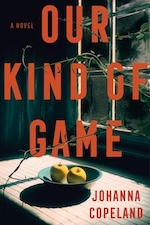
[This interview is reprinted with permission from www.workinprogressinprogress.com.]
Give us your elevator pitch: what’s your book about in 2-3 sentences?
I first described the book as, “It’s about women who do bad things to violent men,” which always got an “Oooh!” My team at Harpers softened it to “A book that asks what it means for a woman to be in control of her own life.”
Which character did you most enjoy creating? Why? And which character gave you the most trouble, and why?
Paula, Paula, Paula! She was, by far, the most difficult character to write because her voice is so particular. With limited formal education and an undiagnosed learning disorder, her voice is less educated, but I needed readers to trust and respect her intelligence. It was a difficult balance, but with each subsequent draft she became my favorite character because Paula functions as the moral center of the book.
Tell us a bit about the highs and lows of your book’s road to publication.
The road to publishing this book has been ridiculously fun. Like the Anne Hathaway movie about a woman who gets a book published. In brief, this book was pre-empted by my favorite editor of the group who made offers. Since that time, my team has been amazing. However, this experience comes after starring in no less than three horror movies filmed over the previous decade, where a woman questions her life choices after going out on endless rounds of fruitless submission.
What’s your favorite piece of writing advice?
Persevere, but be kind to yourself. I’m good at the first part of that advice and terrible at the second part. I always forget that writing is actually hard work. As though plot, setting and dialogue should just flow, right?!? When they don’t, I assume the problem is me. This is when I have to take a step back and remind myself that writing is actually a difficult job and I shouldn’t be so mean to the writer.
My favorite writing advice is “write until something surprises you.” What surprised you in the writing of this book?
So many of the twists in this book revealed themselves as I was writing it. That’s something that always happens, but still catches me by surprise. I wish I wrote from an outline so I could avoid the stress of not knowing how outstanding threads will weave into the plot, but I’m just not that person. In this book, there’s a twist/reveal in the last chapter that didn’t come until the fourth revision. It was hanging out there unresolved, then suddenly it clicked. For me, those moments are the most surprising and satisfying parts of novel writing.
Who is your ideal reader?
Our Kind of Game is marketed as a domestic thriller or women’s fiction, which makes it a little weird that my ideal reader is men in heterosexual relationships. While it’s a cathartic read for women, the men who’ve read it tell me it challenged their perceptions around the way they think about their partner’s domestic labor. I can’t imagine a better outcome for a reader than a book that challenges preconceived notions and entertains.
Inquiring foodies and hungry book clubs want to know: Any food/s associated with your book?
Ahahaha, I have a great recipe for canned cherries! I can’t say anything else without it being a spoiler, but after people read this book, they’ll understand why that question made me laugh out loud.
*****
READ MORE ABOUT THIS BOOK: https://www.harpercollins.com/products/our-kind-of-game-johanna-copeland?variant=41141589966882
ORDER THIS BOOK FOR YOUR TBR STACK: https://bookshop.org/p/books/our-kind-of-game-johanna-copeland/21024793